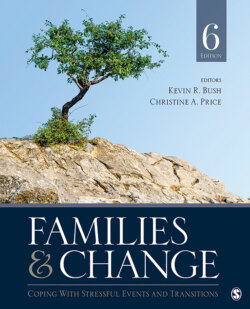Читать книгу Families & Change - Группа авторов - Страница 74
На сайте Литреса книга снята с продажи.
Chronic Stressors: Child Effects
ОглавлениеAnother source of chronic stress, specific child characteristics, often contribute to parental stress when the shock of the initial recognition of a child’s characteristic subsides and realities set in about the long-term challenges. Often referred to as the child effects perspective, this source of parental stress results from the impact of children’s health, physical handicaps, and well-being on the socioemotional lives of parents (Ambert, 1997; Bush & Peterson, 2013; Neece et al., 2012; Rich, 2017). Having children who have congenital birth defects, physical discrepancies, long-term illnesses, problematic behavior patterns (e.g., aggressiveness and disruptive behavior), socioemotional problems, attention-deficit/hyperactivity disorder (ADHD), autism, and schizophrenia, can create stressful circumstances for parents over the long term (Ambert, 1997; Beernink, Swinkels, Van der Gaag, & Buitelaar, 2012; Deater-Deckard, 2004; Hastings, 2002; Silva & Schalock, 2012, Vernhet et al., 2019). These accumulating conditions can result from treatment costs, social stigma, demanding supervision requirements, and constant demands for care even during the parents’ later years of life. These difficult circumstances create considerable potential for parents to experience stress, anger, embarrassment, guilt, despair, and a diminished sense of parental efficacy (Ambert, 1997, 1999; Caldwell et al., 2007).
